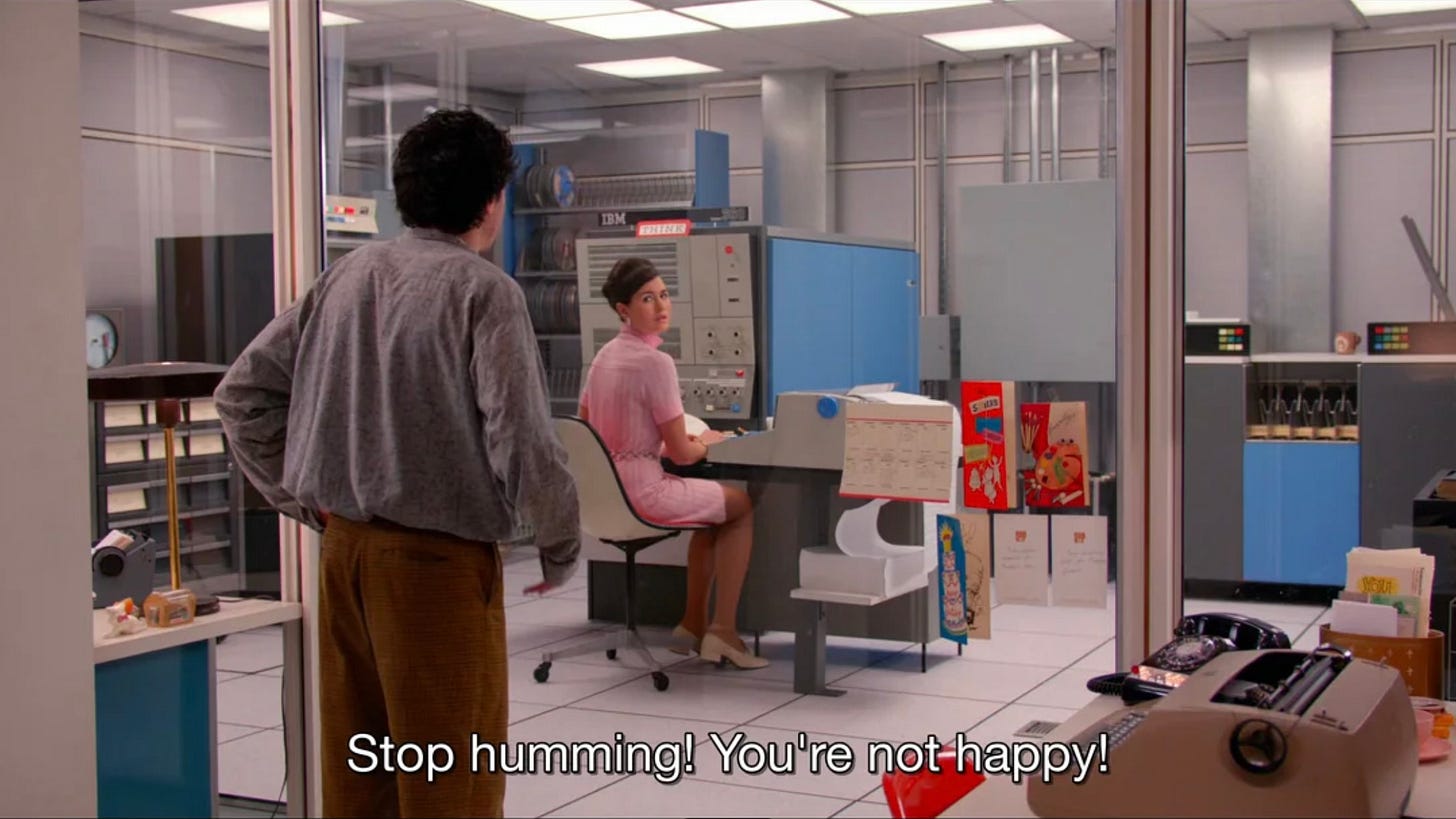Doing Stuff
You can't spell existential malaise without AI.
I use AI for exactly one thing: transcribing. At no point in this process do the AI and I address one another by name, although it technically has one (Alice) and presumably knows mine from the invoices attached to my account. It’s strictly business. I upload an audio file, and a few minutes later the AI emails me the completed transcription. I then spend the next 20 minutes putting all the swear words back in, which the AI prefers to omit altogether rather than pave over with a few asterisks. Before this program, I failed to fully appreciate fuck’s load-bearing qualities, and I’ve come to detest its amputations by premature period of sentences that once landed with a well-deployed as/to/for shit.
Anyway, it’s a great week for people who don’t use AI and enjoy feeling smug about it. We already knew LLMs made you lonelier, and a new MIT study found they also make you measurably dumber and lazier. I am, as it happens, one of the smug ones. But more than that I resent the paradigm created by public access to these machines. For the vast majority of human history, there was only doing and not doing. Doing something produced something. Doing nothing produced nothing. Now AI has created this grotesque alternative to the dichotomy of doing or not doing, one in which doing nothing produces something.
AI is used because it exists. Because it exists, it is always lurking in the back of my psyche. I am never just writing because that’s how writing gets done, I am now always making a conscious choice to not use AI. For years I did the grunt work of early drafts and research without considering these processes inherently separate. That these steps are now skippable, however superficially, disturbs me profoundly. I assumed the borders between the beginning, middle, and end of the creative process were porous. I assumed that the work done in the early stages shaped later iterations even after it was edited out or otherwise discarded—that the writing process was not a series of steps taken but an intricate weaving together of initial ideas and hard-won mid-draft revelations and pithy final points. Now I can’t assume this. Now that machines capable of doing the early work for me exist, I am forced to believe it and, worst of all, defend its value.
The most significant technological innovations of the last 200 years either invented new ways of doing or opened new, wider planes for existing actions. Cars invented driving. Cameras beget photography, then cinema. Telephones extended the reach of conversation; radios the scope of performance and disseminating public information. Computers revolutionized correspondence, design, mathematical and scientific research. We invented new things, and we used them to do things. What AI has robbed us of is the very act of doing, which is to say the fundamental human business of filling a lifetime. A prompt, even a detailed one, is not an action. It is the prelude to an action.
I don’t automatically condemn students who succumb to the temptation of The Magical Essay Writing Machine. I doubt 16-year-old me would have been convinced to close ChatGPT by an MIT study or the argument that the pursuit of knowledge is central to the human project. Teenaged égoïste that I was, I still would have scoffed at the idea that 800 words by me on Hester Prynne had any more of an impact on the human project than beating my Temple Run high score, which is how I would have preferred to spend the evening.
And that’s the trouble, isn’t it? Once ChatGPT generates our proverbial high schooler’s essay on The Scarlet Letter, how do they spend the next two hours? Do they pick up The Grapes of Wrath because they’re fast discovering they prefer Steinbeck’s Realism to Hawthorne’s Romanticism? Do they pick up their half-finished knitting project, or their sketchbook, or anything else besides their phone? What AI is actually doing is delivering us into the jaws of a triumphant attention economy. LLMs have knocked down the final, tyrannical buffer of the midterm essay that once kept millions of students off Instagram for multiple hours. Return, my children, to the loving glow of infinite content, and stay forever!
I fear the unholy marriage of the digital attention economy and AI. I fear the rupture it has created in the basic logic of doing versus not doing. We’ve already proven unable to resist its promise: Do nothing, but still enjoy the illusion of production. Be nothing, in fact, and you will still be perpetually entertained.



Authentic Intelligence will always be superior.
The fake can ‘scrape’ large language models, but writers make correlations and relationships with more than just intelligence; the soul inside chooses what is most interesting or pertinent.
Please take a moment to remember when you wrote something that you just knew was excellent; that feeling of deep satisfaction, pride, and accomplishment. That goodness then radiates out into your community, glowing up those you encounter.
AI is sterile and will never move anyone. I think smart people will grow out of the current fascination about it, like with polyester clothes: yeech.
What’s appalling is how much electrical power is used by this junk. On my last trip through the sublime orchards of eastern Washington state, I saw several vast server farms that had been built on prime fertile properties. When people figure out that their power bills are skyrocketing because of jerks like Zuckerberg playing god, it will slow down. I hope.
You keep doing your artistic encounters!
I appreciate your unique point of view.
A
Seattle, WA USA